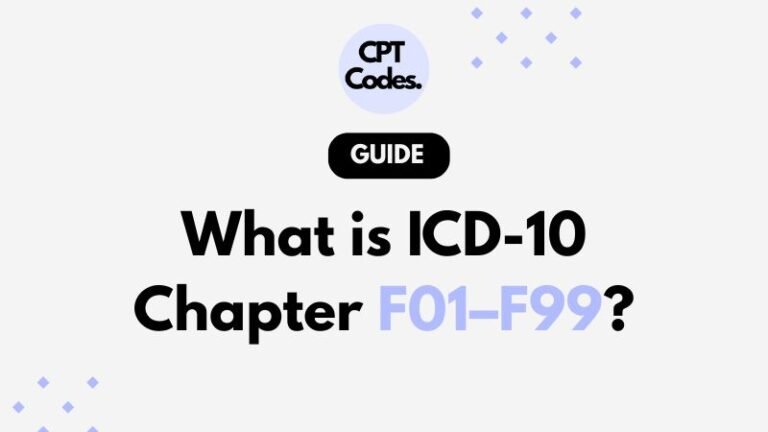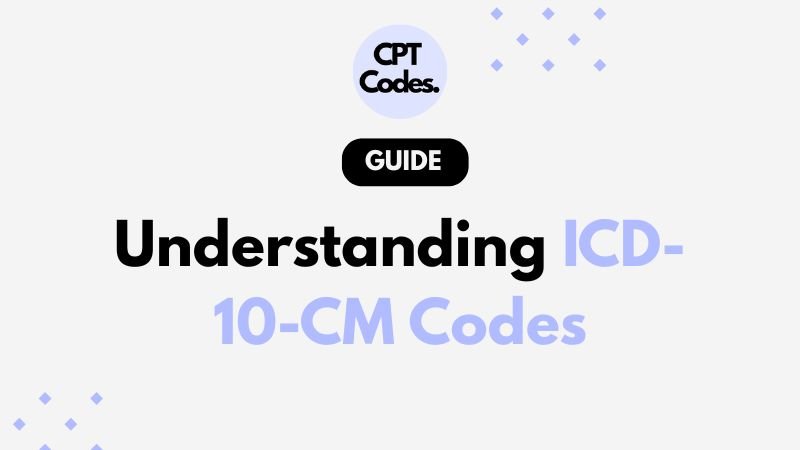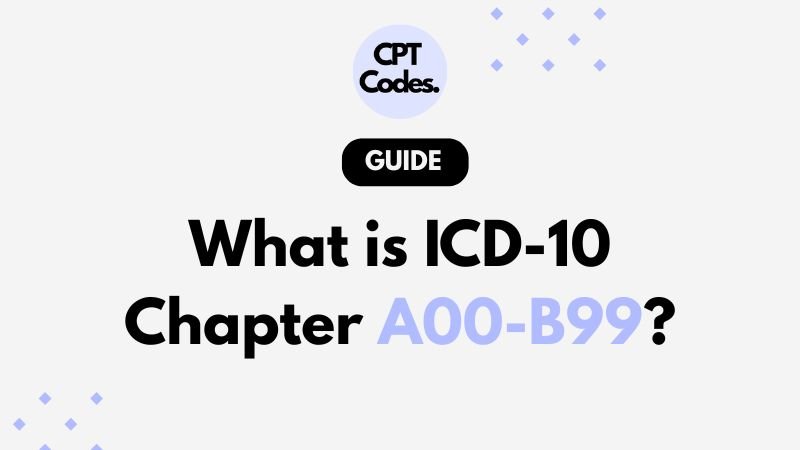ICD-10 codes from F01 to F99 cover mental, behavioral, and neurodevelopmental disorders. These include conditions such as dementia, substance use disorders, schizophrenia, mood disorders like depression and bipolar disorder, anxiety and stress-related disorders, personality disorders, developmental disorders such as autism, and unspecified mental disorders.
Understanding the F01–F99 Code Range
The ICD-10 (International Classification of Diseases, 10th Revision) is a global health coding system that classifies diseases and health conditions. Chapter V of ICD-10 is dedicated to mental, behavioral, and neurodevelopmental disorders, which fall under the code range F00 to F99.
The F01–F99 section helps medical professionals record and report mental health diagnoses consistently across healthcare systems.
Code Range Breakdown
| Code Range | Category | Description |
|---|---|---|
| F00–F09 | Organic mental disorders | Mental conditions caused by brain disease or dysfunction, such as Alzheimer’s and vascular dementia. |
| F10–F19 | Substance use disorders | Disorders due to alcohol or drug use, including dependence and withdrawal. |
| F20–F29 | Schizophrenia and psychotic disorders | Disorders involving delusions, hallucinations, and disorganized thinking. |
| F30–F39 | Mood (affective) disorders | Includes depression, bipolar disorder, and other mood disturbances. |
| F40–F48 | Anxiety and stress-related disorders | Covers conditions like anxiety, OCD, PTSD, and dissociative disorders. |
| F50–F59 | Behavioral syndromes with physiological disturbances | Eating disorders, sleep disorders, and sexual dysfunction. |
| F60–F69 | Personality and adult behavior disorders | Includes borderline, antisocial, and obsessive-compulsive personality disorders. |
| F70–F79 | Intellectual disabilities | Covers varying degrees of intellectual impairment. |
| F80–F89 | Developmental disorders | Includes autism spectrum disorders, learning disorders, and speech delays. |
| F90–F98 | Childhood behavioral and emotional disorders | Includes ADHD, conduct disorder, and emotional disorders of childhood. |
| F99 | Unspecified mental disorder | Used when no specific diagnosis fits. |
Examples and Key Insights
- Organic disorders (F00–F09): Include mental changes caused by physical brain conditions like Alzheimer’s disease.
- Substance-related disorders (F10–F19): Include alcohol or drug dependence, withdrawal, and substance-induced psychosis.
- Psychotic disorders (F20–F29): Schizophrenia and similar conditions characterized by altered perception of reality.
- Mood disorders (F30–F39): Depression, bipolar disorder, and chronic mood swings fall here.
- Anxiety and stress-related disorders (F40–F48): Include generalized anxiety disorder, OCD, PTSD, and phobias.
- Eating and sleep disorders (F50–F59): Such as anorexia, bulimia, and insomnia.
- Personality disorders (F60–F69): Long-term patterns of behavior and thinking that differ from societal norms.
- Developmental and intellectual disorders (F70–F89): Include autism, language development disorders, and intellectual disabilities.
- Childhood disorders (F90–F98): Conditions often first diagnosed in youth, like ADHD or separation anxiety.
Why the F01–F99 Codes Matter
These codes play an important role in mental healthcare by:
- Ensuring consistency in diagnosis and treatment across healthcare providers.
- Supporting accurate billing and insurance claims.
- Helping researchers track trends in mental and behavioral health.
- Allowing health organizations to monitor public mental health data.
ICD-10 vs. ICD-11: What’s Changed
ICD-11, which replaced ICD-10 in many countries, updates these categories to reflect modern understanding of mental health. It adds more detail to disorders such as complex PTSD and introduces new categories like gaming disorder. However, the core structure—grouping mental, behavioral, and developmental disorders together—remains similar.
Final Thoughts
The ICD-10 F01–F99 chapter provides a clear, structured way to identify and classify mental, behavioral, and neurodevelopmental disorders. From dementia to depression and ADHD, these codes help clinicians communicate precisely, ensuring that people everywhere receive accurate, consistent, and informed care for their mental health.



